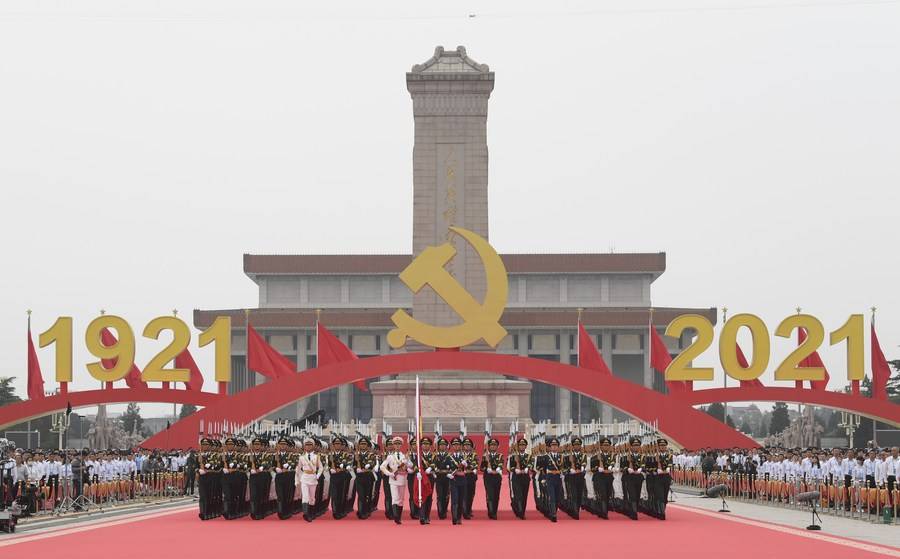At the same time, China is trying to flex its muscles all across its sea and land, such as intrusions in the Taiwan air defence zone and Japanese waters….reports Asian Lite News
In a scare-mongering exercise, the Chinese regime’s mouthpiece is raising the spectre of a looming financial crisis for India.
Global Times warned regional governments to be wary. “The 1997 Asian financial crisis started in Thailand. If a similar crisis happens to India, it would likely send the regional financial markets into an even more severe mess. Governments in the region need act quickly to avert a deepening health and economic crisis,” it said.
The Chinese mouthpiece, in an attempt to cloud India’s prospects, said: “There are also growing concerns that once the Fed shifts monetary policy, India’s economy may be trapped into a debt distress and facing shortage of the dollar.”
The mouthpiece is known to have a pessimistic view of India and recently faulted India’s manufacturing sector.

“While the Indian government has laid bare its ambition to be a manufacturing power, the progress seems limited so far. Nevertheless, during the process of promoting manufacturing, the Indian economy has become gradually dependent on the consistent inflows of Western capital. As a result, the financial risks are piling up,” it said.
It added that other ominous signs about its economic difficulties may also include findings that as many as 97 per cent of Indian households suffered a fall in income and the bearish performance of the Indian rupee this year.
ALSO READ: China closes ports, railways as Typhoon In-Fa reaches Zhejiang
The World Bank last month warned that South Asia risks suffering a financial crisis due to their vulnerability to growing levels of unsustainable debt. “As the region’s biggest economy, India is particularly exposed to sovereign debt and funding risks, especially after the pandemic drove businesses to go bankrupt and left millions unemployed,” it said.
China is trying to project a grim outlook as Global Times said “If the second wave of the virus has devastated India more deeply than anticipated, the long-term economic impact may be even more devastating”.
At the same time, China is trying to flex its muscles all across its sea and land, such as intrusions in the Taiwan air defence zone and Japanese waters.
A Chinese military aircraft entered Taiwan’s air identification zone (ADIZ) on Sunday afternoon, marking the 12th intrusion by the People’s Liberation Army Air Force this month.
A People’s Liberation Army Air Force (PLAAF) Shaanxi Y-8 anti-submarine warfare plane was tracked in the southwestern corner of the ADIZ on Sunday, Taiwan Defence Ministry announced.

In response, Taiwan sent aircraft, broadcast radio warnings, and deployed air defence missile systems to track the plane, Taiwan News reported.
All the planes so far this month have been slower-flying turboprops and included anti-submarine warfare, electronic warfare, and reconnaissance variants.
Since mid-September of last year, Beijing has stepped up its grey-zone tactics by regularly sending planes into Taiwan’s ADIZ, with most instances occurring in the southwest corner of the zone and usually consisting of one to three slow-flying turboprop planes.
Beijing claims full sovereignty over Taiwan, a democracy of almost 24 million people located off the southeastern coast of mainland China, despite the fact that the two sides have been governed separately for more than seven decades.
Taipei, on the other hand, has countered the Chinese aggression by increasing strategic ties with democracies including the US, which has been repeatedly opposed by Beijing. China has threatened that “Taiwan’s independence” means war.
On June 1, Chinese President Xi Jinping pledged to complete reunification with self-ruled Taiwan and vowed to smash any attempts at formal independence for the island.
Reacting to Xi’s remarks, Taiwan’s Mainland Affairs Council (MAC) accused the CCP of tightening its dictatorship in the name of national rejuvenation internally and attempting to alter the international order with its hegemonic ambitions externally, Focus Taiwan reported.
“We urge the other side of the strait to learn from history and push for democratic reforms,” the MAC said, calling on the CCP to stop expansionist behaviour and to act as a responsible party in promoting regional peace. (ANI)

Leave a Reply